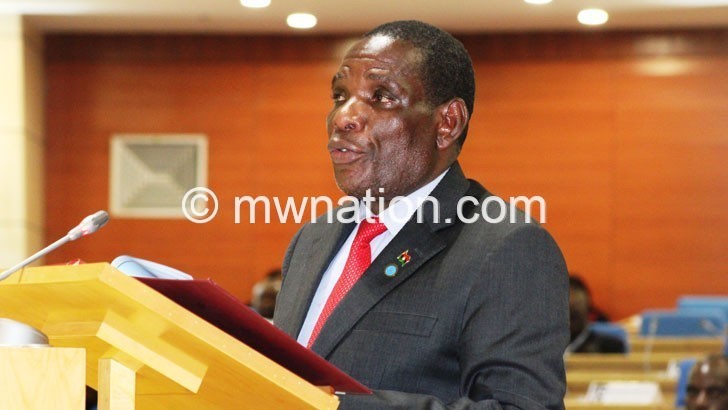4 pillars to anchor 2019/20 fiscal plan
Ahead of 2019/20 Budget presentation in Lilongwe today, Minister of Finance Economic Planning and Development Joseph Mwanamvekha has outlined four key growth areas that will anchor the fiscal plan.
In an interview in Lilongwe on Friday, the minister said the four pillars that will help to grow the economy are agriculture, energy, trade facilitation and mining.
Said Mwanamvekha: “In agriculture, we want to ensure that production and productivity improves with much emphasis on agro-processing. The second issue is energy and as you know that the country cannot grow, cannot create jobs if there is no power, so we want to invest more on power so that we deal with power shortages.

“We will look at trade facilitation and tourism. We would like to look at mining sector as we believe the country has greater potential to develop the mining sector. We want to deal with debt management because at the current level, our debt is not sustainable. We want to create jobs,especially for the youth and women.”
He said Treasury is happy that lending to the private sector is now increasing, adding this means government borrowing is also coming down, a trend government wants to maintain.
Mwanamvekha said Treasury wants to improve revenue collection either through Malawi Revenue Authority or through non-tax revenues.
“We also need to reduce on expenditures. So, as we increase revenue collection with low expenditure, we will be narrowing on borrowing,” he said, adding that Treasury’s role will be to provide an enabling environment for commercial banks to lend to the private sector than lending to government.
Reserve Bank of Malawi Governor DalitsoKabambe said in an interview that after achieving stability in the economy, it is important to focus on growth and job creation for the youth and women.
He said there have been cumulative achievements in the economy and that private sector growth is picking up, signalling that economic growth is now private sector-led.
Said Kabambe: “In 2012, private sector growth was negative, it is only in August 2018 that it became, in real terms, positive. It is now 12 to 13 months that the private sector-led growth has grown by over K100 billion.
“We need to continue with that growth because that is what will begin to show in real growth of private sector expansion.”
Earlier, Economics Association of Malawi (Ecama) executive director MalekaThula challenged Treasury to cut on both public debt and also narrow budget deficit if the economy is to sustain gains accrued.
He said it is hard to achieve meaningful economic growth if more resources are being channelled to non-productive sectors.
Public debt, which comprises domestic and external debt stood at around K3.3 trillion as of December 2018, which is twice the country’s 2018/19 revised national budget of K1.4 trillion and is estimated at 72 percent of the country’s total wealth as measured by nominal gross domestic product (GDP).





